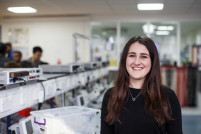
Business and research environments need engineers who can design complete solutions involving complex integrated systems. Biomedical Engineering at Kent educates engineers that can develop systems used in medical practice and biology research.
This cross-disciplinary programme is designed for students with an equally strong interest in engineering and biology/medicine. Drawing from our established expertise in engineering technologies and from the research synergies with the School of Biosciences, this degree produces engineers with a solid knowledge in biology and medical science.
In the first year, you gain a broad grounding in biomedical engineering, including human physiology, biomedical skills, robotics and engineering mathematics. You also undertake laboratory-based practical work.
In the second year and final years, you study modules that build upon the material learnt in the first year. As your knowledge grows, you discover which areas particularly interest you, so that in your final year you can specialise in preparation for your final-year design or development-based engineering project.

We have 24-hour access to the computer labs, and that’s really, really helpful.
Camilla Felici - Biomedical Engineering BEng
The University will consider applications from students offering a wide range of qualifications. All applications are assessed on an individual basis but some of our typical requirements are listed below. Students offering qualifications not listed are welcome to contact our Admissions Team for further advice. Please also see our general entry requirements.
ABB - BBB including B in Mathematics plus one other science/technology subject (Physics, Computing or Electronics)
The University welcomes applications from Access to Higher Education Diploma candidates for consideration. A typical offer may require you to obtain a proportion of Level 3 credits in relevant subjects at merit grade or above.
DMM in an Engineering subject including Further Maths/Further Maths for Engineering Technicians. Other subjects are considered on a case-by-case basis. Please contact us for further advice on your individual circumstances.
30 points overall or 15 points at HL including Mathematics (not Mathematics Studies) 5 at HL or 6 at SL or HL Maths: Analysis and Approaches at 5 (not Applications and Interpretations), and a science subject 5 at HL or 6 at SL
N/A
The University will consider applicants holding T level qualifications in subjects closely aligned to the course.
Please contact the School for more information at CEMSadmissions@kent.ac.uk
If you are an international student, visit our International Student website for further information about entry requirements for your country, including details of the International Foundation Programmes. Please note that international fee-paying students who require a Student visa cannot undertake a part-time programme due to visa restrictions.
Please note that meeting the typical offer/minimum requirement does not guarantee that you will receive an offer.
Please see our English language entry requirements web page.
Please note that if you do not meet our English language requirements, we offer a number of 'pre-sessional' courses in English for Academic Purposes. You attend these courses before starting your degree programme.
Duration: 3 years full-time
The following modules are indicative of those offered on this programme. This listing is based on the current curriculum and may change year to year in response to new curriculum developments and innovation.
On most programmes, you study a combination of compulsory and optional modules. You may also be able to take ‘elective’ modules from other programmes so you can customise your programme and explore other subjects that interest you.
Compulsory modules currently include
EENG3130 - Introduction to Programming (15 credits)
EENG3230 - Engineering Design and Mechanics (15 credits)
BIOS3070 - Human Physiology and Disease (15 credits)
EENG3050 - Introduction to Electronics (15 credits)
EENG3110 - First Year Engineering Applications Project (15 credits)
EENG3150 - Digital Technologies (15 credits)
EENG3180 - Engineering Mathematics (15 credits)
EENG3190 - Engineering Analysis (15 credits)
Compulsory modules currently include
BIOS5130 - Human Physiology and Disease II (15 credits)
EENG5170 - Control and Mechatronics (15 credits)
EENG5770 - Entrepreneurship and Professional Development (15 credits)
EENG5160 - Biomechanics (15 credits)
EENG5150 - Physiological Measurements (15 credits)
EENG5610 - Image Analysis and Applications (15 credits)
EENG5620 - Engineering Group Project (15 credits)
EENG5190 - Introduction to Fluid Dynamics (15 credits)
Compulsory modules currently include
EENG6460 - Robotics and Artificial Intelligence (15 credits)
EENG6000 - Project (45 credits)
EENG6141 - Biomaterials (15 credits)
EENG6830 - Reliability, Availability, Maintainability and Safety (RAMS) (15 credits)
EENG6760 - Digital Signal Processing and Control (15 credits)
Optional modules may include
EENG5220 - Design & Manufacturing Technology (15 credits)
EENG6770 - Communication Network and IoT (15 credits)
PHYS5130 - Medical Physics (15 credits)
EENG5090 - Virtual Reality (15 credits)
The 2022/23 annual tuition fees for this course are:
For details of when and how to pay fees and charges, please see our Student Finance Guide.
For students continuing on this programme, fees will increase year on year by no more than RPI + 3% in each academic year of study except where regulated.*
The University will assess your fee status as part of the application process. If you are uncertain about your fee status you may wish to seek advice from UKCISA before applying.
There are no mandatory course-specific costs but please refer to our general additional costs page.
Find out more about accommodation and living costs, plus general additional costs that you may pay when studying at Kent.
We have a range of subject-specific awards and scholarships for academic, sporting and musical achievement.
Search scholarshipsKent offers generous financial support schemes to assist eligible undergraduate students during their studies. See our funding page for more details.
You may be eligible for government finance to help pay for the costs of studying. See the Government's student finance website.
Scholarships are available for excellence in academic performance, sport and music and are awarded on merit. For further information on the range of awards available and to make an application see our scholarships website.
At Kent we recognise, encourage and reward excellence. We have created the Kent Scholarship for Academic Excellence.
The scholarship will be awarded to any applicant who achieves a minimum of A*AA over three A levels, or the equivalent qualifications (including BTEC and IB) as specified on our scholarships pages.
Lectures; tutorial lectures; demonstrator-led examples classes; tutor-led small group supervisions; project work; laboratory experiments and computer-based assignments. Case studies on industry hot topics and emerging technologies. In particular the first, second and third-year projects give hands-on experience of electronic design and project management.
Problem-solving workshops allow you to develop skills in applying biomedical knowledge to solution of problems. Practical classes teach specific laboratory skills and demonstrate how they can be used to investigate biomedical systems.
Written unseen examinations; assessed coursework in the form of examples, class assignments, laboratory write-ups, assessed project work, assignments and essays and class tests.
For a student studying full time, each academic year of the programme will comprise 1200 learning hours which include both direct contact hours and private study hours. The precise breakdown of hours will be subject dependent and will vary according to modules. Please refer to the individual module details under Course Structure.
Methods of assessment will vary according to subject specialism and individual modules. Please refer to the individual module details under Course Structure.
The programme aims to:
You gain knowledge and understanding of:
You gain the following intellectual abilities:
You gain subject-specific skills in the following:
You gain transferable skills in the following:
The School of Engineering has an excellent record of student employability. Previous graduates have gone on to careers in:
Other graduates have gone on to work for a range of organisations including:
The School of Engineering holds an annual Employability and Careers Day where you can meet local and national employers and discuss career opportunities. Ongoing support is provided by the School's dedicated Employability Officer.
The University also has a friendly Careers and Employability Service which can give you advice on how to:
Alongside specialist skills, you also develop the transferable skills graduate employers look for, including the ability to:
You can gain extra skills by signing up for one of our Kent Extra activities, such as learning a language or volunteering.
Our programme is accredited by the Institution of Engineering and Technology (IET), which enables fast-track career progression as a professional engineer.
This course page is for the 2022/23 academic year. Please visit the current online prospectus for a list of undergraduate courses we offer.
T: +44 (0)1227 823254
E: internationalstudent@kent.ac.uk
Discover Uni is designed to support prospective students in deciding whether, where and what to study. The site replaces Unistats from September 2019.
Discover Uni is jointly owned by the Office for Students, the Department for the Economy Northern Ireland, the Higher Education Funding Council for Wales and the Scottish Funding Council.
It includes:
Find out more about the Unistats dataset on the Higher Education Statistics Agency website.